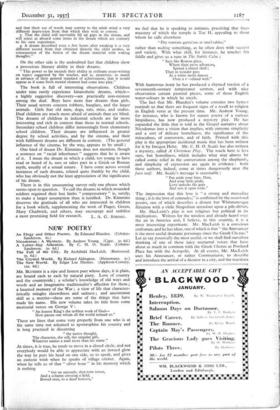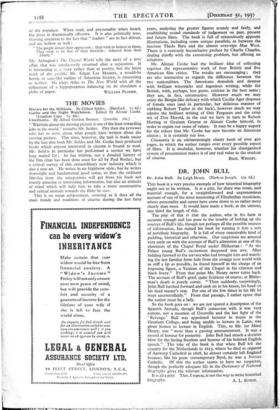NEW POETRY
An Elegy and Other Poems. By Edmund Blunden. (Cobden- Sanderson. 6s.) MR. BLUNDEN is a ripe and honest poet whose days, it is plain, are bound each to each by natural piety. Love of country and the countryside ; a scholar's knowledge of old ways and words and an imaginative traditionalist's affection for them ; a haunted memory of the War ; a view of life that character- istically mingles shrewdness and sadness ; and uncommon skill as a metrist—these are some of the things that have made his name. His new volume takes its title from some memorial verses on George V : " An honest King's the noblest work of God— Now passes one whom all the world termed so."
These are lines that come very properly from one who is at the same time not ashamed to apostrophise his country and is long practised in discerning
" the native thought, The character, the self, the singular gift, Whatever names a man more than his name."
At times, it is true, he tends to move in a closed circle, and not everybody would be able to appreciate with an inward glow the way he puts his head on one side, so to speak, and gives an esoteric wink when he speaks of village cricket. Again, when he tells us of that " silver hour " in his memory which is nothing " but an uncouth, shot-torn tower, And a column crossing a field, Bowed men, to a dead horizon," we feel that he is speaking to initiates, practising that free- masonry of which the temple is Toc H, appealing to those whom he calls elsewhere "Dry veterans garru!ous at small tables,"
rather than making something, as he often does with success and variety. With what skill, for instance, he touches his fiddle and gives us a tune in The Subtle Calm :
" Seas like Roman glass, Where their prow advances, Spread a tinted shell ; They in wonder pass As a white moth dances Over a wiodland well."
With humorous irony he has produced a rhymed version of a seventeenth-century temperance sermon, and with nice observation certain pastoral pieces, some of those English water-colours in which he excels.
The fact that Mr. Blunden's volume contains two hymns reminds us that there are frequent signs of a recall to religion in English verse at the present time. Mr. Andrew Young, for instance, who is known for nature poetry of a curious limpidness, has now produced a mystery play. He has expanded the little that is told in the Gospel narrative about Nicodemus into a vision that implies, with extreme simplicity and a sort of delicate homeliness, the significance of the miraculous, of conversion, and of faith. Printed with this
play is the appropriate incidental music that has been written for it by Imogen Holst. Mr. C. H. 0. Scaife has also written a mystery, called A Christmas Play. The touch here is less sure, but homeliness, which includes what may almost be
called comic relief in the conversation among the shepherds, and simplicity of expression are again in evidence : both
these authors, indeed, come at times dangerously near the faux nail Mr. Scaife's message is seasonable :
" Put aside your hate, Man, And your little pride, Love unlocks the gate And sets it open wide."
The impression that this love is " a strong and masculine thing ; it is the love of comrades," is confirmed by the occasional poems, one of which describes a distant but Whitmanesque flirtation with a virile Neapolitan attendant upon a pile-driver.
Mr. MacLeish's play is not religious but political in its implications. Written for the wireless and already heard over the air in America and, I believe, in this country, it is a most interesting experiment. Mr. MacLeish is a conscious craftsman, and he has ideas, one of which is that " the Announcer
is the most useful dramatic personage since the Greek Chcrus." Let us say potentially the most useful, or we shall find ourselves thinking of one of those juicy nocturnal voices that have about as much in common with the Greek Chorus as Portland Place has with the Acropolis. At all events, Mr. MacLeish uses his Announcer, or rather Commentator, to describe and introduce the arrival of a dictator in a city, and the reactions
of the populace. When read, and presumably when heard, the piece is dramatically effective. It is also politically true, drawing attention to the fact that " leaders " are in fact driven, and are hollow as well :
" The people invent their oppressors : they wish to believe in them, They wish to be free of their freedom : released from their liberty."
Mr. Aldington's The Crystal World tells the story of a love affair that was satisfactorily resumed after a separation. It is interesting as a story rather than as poetry, but the latest work of the prolific Mr. Edgar Lee Masters, a would-be heroic or saga-like outline of American history, is interesting as neither. He plays Atlas to The New World with all the refinement of a hippopotamus balancing on its shoulders a

































 Previous page
Previous page